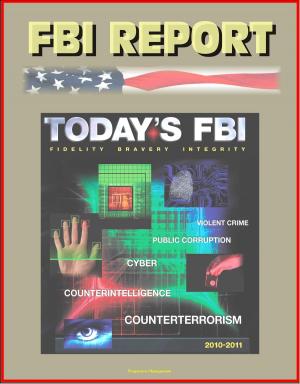The Department of Homeland Security's Role in Protecting the National Economy: Border Trade Enforcement and Facilitation Missions to Provide Commercially Meaningful Benefits to Stakeholders
Business & Finance, Economics, Exports & Imports| Author: | Progressive Management | ISBN: | 9780463266038 |
| Publisher: | Progressive Management | Publication: | August 2, 2018 |
| Imprint: | Smashwords Edition | Language: | English |
| Author: | Progressive Management |
| ISBN: | 9780463266038 |
| Publisher: | Progressive Management |
| Publication: | August 2, 2018 |
| Imprint: | Smashwords Edition |
| Language: | English |
This late 2017 report has been professionally converted for accurate flowing-text e-book format reproduction. The national economy and the vital commercial flows that feed it are the sine quibus non of national influence, power, and security. However, new characteristics of the modern trade environment have the potential to undermine U.S. economic prosperity. The Department of Homeland Security (DHS) claims that homeland security is inseparable from economic security and, as such, that the department has a role to play in supporting national economic security goals. However, DHS has yet to fully reconcile the tension between its trade enforcement and facilitation missions and clarify its role in supporting national economic competitiveness goals. After identifying and assessing several policy alternatives, this paper concludes that DHS should aggressively leverage its unique border authorities to influence a shift toward a more centralized model of government controls of imports, one informed by economy-wide strategic objectives and reliant upon standard performance measures, shared funding schemes, common information technology infrastructures, and delegated decision making on the admissibility of goods. Such an effort could provide commercially meaningful benefits to public and private stakeholders alike while maintaining security and safety requirements.
I. INTRODUCTION * A. PROBLEM STATEMENT * B. HYPOTHESIS * C. METHODS AND SOURCES/RESEARCH DESIGN * 1. Objective of Study and Rationale * 2. Scope of Work * 3. Instrumentation (Data and Evidence) * 4. Selection Criteria and Steps of Analysis * D. LITERATURE REVIEW * 1. Relationship between National Security and Economic Priorities * 2. Trade Facilitation * II. SAYING BUT NOT DOING: CONTRASTING OPERATIONAL REALITIES IN THE MODERN TRADE ENVIRONMENT AND DHS POLICY OBJECTIVES * A. THE MODERN TRADE ENVIRONMENT * 1. The Evolving Trade Environment * 2. Post-9/11 Security Measures * B. THE CONCEPT OF TRADE FACILITATION * 1. Impact of Current Government Policies and Regulatory Environment * 2. The Role of DHS in Trade Facilitation * III. POLICY OPTIONS AND EVALUATION METHODOLOGY * A. POLICY OPTIONS * B. EVALUATION METHODOLOGY * 1. First Evaluation Criterion * 2. Second Evaluation Criterion * 3. Third Evaluation Criterion * IV. EVALUATING THE POLICY OPTIONS * A. POLICY OPTION 1: MAINTAIN THE STATS QUO * 1. Advantages * 2. Challenges * B. POLICY OPTION 2: TAILORED MODERNIZATION * 1. Advantages * 2. Challenges * C. POLICY OPTION 3: SHIFTING THE PARADIGM * 1. Introducing Policy Option 3 * 2. An Overview of the Singapore Model * 3. Advantages * 4. Challenges * D. RECOMMENDED PATH FORWARD * V. CONCLUSION * A. NEXT STEPS FOR IMPLEMENTING POLICY OPTION 3 SHIFTING THE PARADIGM * B. ISSUES REQUIRING ADDITIONAL STUDY
This late 2017 report has been professionally converted for accurate flowing-text e-book format reproduction. The national economy and the vital commercial flows that feed it are the sine quibus non of national influence, power, and security. However, new characteristics of the modern trade environment have the potential to undermine U.S. economic prosperity. The Department of Homeland Security (DHS) claims that homeland security is inseparable from economic security and, as such, that the department has a role to play in supporting national economic security goals. However, DHS has yet to fully reconcile the tension between its trade enforcement and facilitation missions and clarify its role in supporting national economic competitiveness goals. After identifying and assessing several policy alternatives, this paper concludes that DHS should aggressively leverage its unique border authorities to influence a shift toward a more centralized model of government controls of imports, one informed by economy-wide strategic objectives and reliant upon standard performance measures, shared funding schemes, common information technology infrastructures, and delegated decision making on the admissibility of goods. Such an effort could provide commercially meaningful benefits to public and private stakeholders alike while maintaining security and safety requirements.
I. INTRODUCTION * A. PROBLEM STATEMENT * B. HYPOTHESIS * C. METHODS AND SOURCES/RESEARCH DESIGN * 1. Objective of Study and Rationale * 2. Scope of Work * 3. Instrumentation (Data and Evidence) * 4. Selection Criteria and Steps of Analysis * D. LITERATURE REVIEW * 1. Relationship between National Security and Economic Priorities * 2. Trade Facilitation * II. SAYING BUT NOT DOING: CONTRASTING OPERATIONAL REALITIES IN THE MODERN TRADE ENVIRONMENT AND DHS POLICY OBJECTIVES * A. THE MODERN TRADE ENVIRONMENT * 1. The Evolving Trade Environment * 2. Post-9/11 Security Measures * B. THE CONCEPT OF TRADE FACILITATION * 1. Impact of Current Government Policies and Regulatory Environment * 2. The Role of DHS in Trade Facilitation * III. POLICY OPTIONS AND EVALUATION METHODOLOGY * A. POLICY OPTIONS * B. EVALUATION METHODOLOGY * 1. First Evaluation Criterion * 2. Second Evaluation Criterion * 3. Third Evaluation Criterion * IV. EVALUATING THE POLICY OPTIONS * A. POLICY OPTION 1: MAINTAIN THE STATS QUO * 1. Advantages * 2. Challenges * B. POLICY OPTION 2: TAILORED MODERNIZATION * 1. Advantages * 2. Challenges * C. POLICY OPTION 3: SHIFTING THE PARADIGM * 1. Introducing Policy Option 3 * 2. An Overview of the Singapore Model * 3. Advantages * 4. Challenges * D. RECOMMENDED PATH FORWARD * V. CONCLUSION * A. NEXT STEPS FOR IMPLEMENTING POLICY OPTION 3 SHIFTING THE PARADIGM * B. ISSUES REQUIRING ADDITIONAL STUDY















